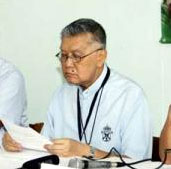Church steps up initiative against pork
Church-based and nongovernment organizations in Iloilo and Pampanga provinces have launched a signature campaign in support of a people’s initiative for a bill to abolish and make illegal all forms of pork barrel.
Jaro Archbishop Angel Lagdameo led church leaders, professionals, businessmen and militants in the signing of a covenant for the people’s initiative.
“We have started a revolution. All the weapons are prepared—ballpens and papers,” Lagdameo said in a speech before the assembly at the Archbishop’s Palace in Jaro District.
The 1987 Constitution allows the passage of a law through a people’s initiative or a petition by at least 12 percent of the total number of registered voters, of which every legislative district must be represented by at least 3 percent of the registered voters. The country has 234 legislative districts.
The proposed act seeks to prohibit all forms of pork barrel, defined as the use of “lump-sum public funds” under the “sole discretion of the President, legislator or group of legislators, or any public officer.”
Article continues after this advertisementIn Pampanga, some 1,000 lay leaders of United Methodist Church (UMC) are taking the people’s initiative to communities.
Article continues after this advertisement“We have not rested in helping the campaign although the Supreme Court has ruled the pork barrel (Priority Development Assistance Fund or PDAF) and the Disbursement Acceleration Program (DAP) to be unconstitutional. We need a law to prevent the misuse by elected leaders of public funds,” Bishop Rodolfo Juan of UMC Manila Episcopal Area said in an interview before the leaders marched to the Pampanga capital on Saturday.
The national movement for the people’s initiative, which was launched in Cebu on Aug. 23, hopes to gather the signatures of at least 6 million registered voters by early next year. At least 3 percent of voters for each congressional district and at least
10 percent of the total number of voters are needed for a referendum on a new law to be held.
The Commission on Elections (Comelec) will verify the list of signatures submitted to the body.
Lagdameo said the signature campaign was part of continued efforts to institute reforms in the government and against corruption.
“We can change our government. That is what we have been doing … quietly, peacefully, prayerfully. We have done it in the past. We can do it again,” the prelate said, eliciting cheers and applause.
Proponents of the people’s initiative have said that despite Supreme Court rulings, lump-sum appropriations are still present in the 2015 budget.
The allocations provide opportunities for graft and corruption as they give leeway to the discretionary allocation and spending of government funds by lawmakers and other officials, they say.
The Supreme Court has declared unconstitutional the PDAF, or lawmakers’ pork barrel funds, and certain acts of the Aquino administration’s DAP. Malacañang has appealed the ruling on the DAP.
Churches of different denominations would become signature campaign centers, according to Fr. Marco Sulayao, spokesperson for Promotion of Church People’s Response-Panay and vicar general of the Iloilo Diocese of the Iglesia Filipina Independiente.
Similar centers would be set up in schools, communities and offices, said Hope Hervilla, chair of Bagong Alyansang Makabayan-Panay.
The PDAF is allotted to congressmen for their projects, while the DAP has been implemented by the Aquino administration using the savings of agencies to hasten the completion of big-ticket infrastructure projects and urgent antipoverty programs.
Juan said the signature campaign had been stepped up as the deadline for submission of the target number of signatures to the Comelec is December.
Rev. Catherine Roque, chair of UMC Pampanga’s Board on Church and Society, said 83 local churches would be involved in the drive.
The “present outcry against the PDAF and the DAP is all about misappropriating the people’s money while shrugging off any responsibility, especially to the poor of the land, and then shifting that burden to those who create those resources,” UMC Philippines Central Conference said in a statement.
“Taxes and other revenues are all managed and manipulated by the unholy alliance of a political and economic elite for their own benefit and to the neglect of the hungry sheep who are deprived of those resources.”
The statement was signed by Juan, Bishop Pedro Torio Jr. and Bishop Ciriaco Francisco of the Baguio and Davao episcopal areas, respectively.
Juan said UMC had been monitoring hearings on the proposed 2015 budget. Lay leaders, including former Chief Justice Reynato Puno, are checking if the PDAF had been inserted in the P2.6-trillion budget next year.
